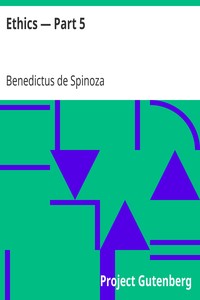Ethics — Part 5 by Benedictus de Spinoza
"Ethics — Part 5" by Benedictus de Spinoza is the fifth part of a philosophical treatise written between 1661 and 1675. Part 5 completes Spinoza's geometrically demonstrated system, examining human freedom and the path to blessedness. Building on his earlier propositions about God, mind, body, and emotions, Spinoza explores how understanding leads to power over passions and ultimately to intellectual love of God. This final section reveals his vision of human perfection
and eternity. (This is an automatically generated summary.)
Read or download for free
| Reading Options | Url | Size | |||
|---|---|---|---|---|---|
| Read now! | https://www.gutenberg.org/ebooks/975.html.images | 91 kB | |||
| EPUB3 (E-readers incl. Send-to-Kindle) | https://www.gutenberg.org/ebooks/975.epub3.images | 95 kB | |||
| EPUB (older E-readers) | https://www.gutenberg.org/ebooks/975.epub.images | 94 kB | |||
| Kindle | https://www.gutenberg.org/ebooks/975.kf8.images | 180 kB | |||
| older Kindles | https://www.gutenberg.org/ebooks/975.kindle.images | 172 kB | |||
| Plain Text UTF-8 | https://www.gutenberg.org/ebooks/975.txt.utf-8 | 79 kB | |||
| Download HTML (zip) | https://www.gutenberg.org/cache/epub/975/pg975-h.zip | 92 kB | |||
| There may be more files related to this item. | |||||
Similar Books
About this eBook
| Author | Spinoza, Benedictus de, 1632-1677 |
|---|---|
| Translator | Elwes, R. H. M. (Robert Harvey Monro), 1853- |
| Title | Ethics — Part 5 |
| Note | Wikipedia page about this book: en.wikipedia.org/wiki/Ethics_(Spinoza_book) |
| Credits | Produced by an anonymous Project Gutenberg volunteer |
| Reading Level | Reading ease score: 63.9 (8th & 9th grade). Neither easy nor difficult to read. |
| Language | English |
| LoC Class | B: Philosophy, Psychology, Religion |
| Subject | Ethics |
| Category | Text |
| EBook-No. | 975 |
| Release Date | Jul 1, 1997 |
| Most Recently Updated | Apr 14, 2013 |
| Copyright Status | Public domain in the USA. |
| Downloads | 486 downloads in the last 30 days. |
| Project Gutenberg eBooks are always free! | |

